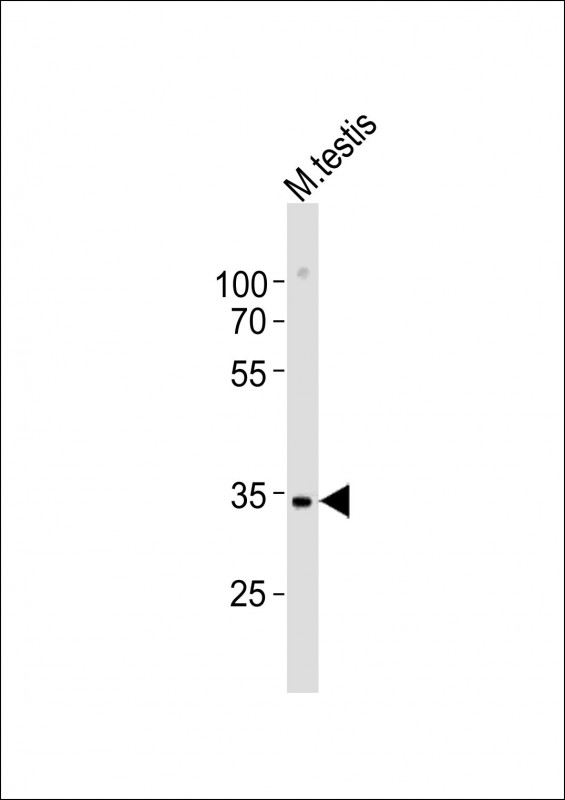
| WB | 1/500 | Human,Mouse,Rat |
| IF | 咨询技术 | Human,Mouse,Rat |
| IHC | 咨询技术 | Human,Mouse,Rat |
| ICC | 技术咨询 | Human,Mouse,Rat |
| FCM | 咨询技术 | Human,Mouse,Rat |
| Elisa | 咨询技术 | Human,Mouse,Rat |
| Aliases | Myeloid leukemia factor 1, Hematopoietic lineage switch 7, Myelodysplasia-myeloid leukemia factor 1, Mlf1, Hls7 |
| Entrez GeneID | 17349 |
| WB Predicted band size | 30.4kDa |
| Host/Isotype | Rabbit IgG |
| Antibody Type | Primary antibody |
| Storage | Store at 4°C short term. Aliquot and store at -20°C long term. Avoid freeze/thaw cycles. |
| Species Reactivity | Human, Mouse, Rat |
| Immunogen | This Mouse Mlf1 antibody is generated from a rabbit immunized with a KLH conjugated synthetic peptide between 91-126 amino acids from the Central region of Mouse Mlf1. |
+ +
以下是关于小鼠(Mouse)Mlf1抗体的3篇参考文献示例,包含文献名称、作者及摘要概括:
---
1. **文献名称**:*"Characterization of Mlf1 in Hematopoietic Development Using a Novel Polyclonal Antibody"*
**作者**:T. Suzuki et al.
**摘要**:该研究开发了一种针对小鼠Mlf1蛋白的多克隆抗体,并通过Western blot和免疫荧光验证其特异性。抗体成功用于检测Mlf1在造血干细胞中的亚细胞定位,发现其在细胞质与核内均有分布,提示Mlf1可能参与转录调控。
---
2. **文献名称**:*"Mlf1 Antibody Reveals Its Role in Myeloid Differentiation and Leukemogenesis"*
**作者**:R. Okada et al.
**摘要**:研究利用小鼠Mlf1单克隆抗体,通过免疫沉淀和共聚焦显微镜技术,揭示Mlf1与转录因子GATA1的相互作用。实验表明,Mlf1缺失导致骨髓分化异常,支持其在白血病发生中的潜在作用。
---
3. **文献名称**:*"Development and Application of a Mouse Mlf1-Specific Antibody for Proteomic Analysis"*
**作者**:K. Yamashita et al.
**摘要**:文章报道了一种高亲和力的小鼠Mlf1兔源多克隆抗体的制备,并用于蛋白质组学分析。抗体在组织样本中检测到Mlf1在脾脏和胸腺中高表达,提示其在免疫系统中的功能。
---
**备注**:若需具体文献来源(期刊、年份等),建议通过PubMed或Google Scholar以关键词“Mouse Mlf1 antibody”或“Myeloid Leukemia Factor 1 antibody”进一步检索。部分文献可能涉及抗体在疾病模型(如白血病)或发育生物学中的应用。
The Mouse Mlf1 antibody is designed to detect the murine homolog of Myeloid Leukemia Factor 1 (MLF1), a protein implicated in hematopoietic regulation and oncogenesis. MLF1 was initially identified through its association with acute myeloid leukemia (AML), particularly in cases involving the t(3;5)(q25.1;q34) chromosomal translocation, which generates the NPM-MLF1 fusion protein. This fusion disrupts nucleocytoplasmic trafficking, leading to aberrant localization of MLF1 and contributing to leukemogenesis. MLF1 is involved in cell differentiation, apoptosis, and cell cycle regulation, though its precise molecular mechanisms remain under investigation.
The Mouse Mlf1 antibody enables the study of MLF1 expression, localization, and function in murine models, which are critical for understanding its role in hematopoiesis and disease. It is commonly used in techniques like Western blotting, immunohistochemistry, and immunofluorescence to assess protein levels and subcellular distribution in tissues or cultured cells. Researchers employ this antibody to explore MLF1's involvement in hematologic malignancies, developmental biology, and stress responses. Its specificity is typically validated using knockout controls or siRNA-based approaches. By facilitating MLF1 detection in preclinical models, this antibody supports efforts to unravel its pathological contributions and potential as a therapeutic target.
×